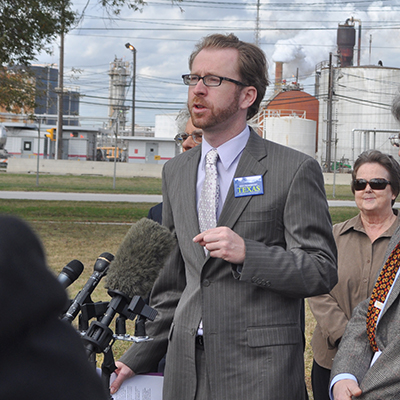
How housing policy impacts climate change
Allowing more people to live in cities can reduce sprawl and long commutes

Texas’ population is growing by leaps and bounds. This growth has brought dynamism to the state, but has also created environmental problems. Because much of the state’s growth has taken place at the fringe of cities, the addition of new residents and businesses has caused persistent and worsening problems with traffic congestion, air pollution and water quality, as more undeveloped land is converted into new development.
To accommodate the continued influx of new people to the state, Texas needs to house a growing population in ways that minimize the increase of developed land. Allowing taller residential buildings, Accessory Dwelling Units (ADUs) – additional dwellings on the same property as an existing house – such as a garage apartment or “granny flats,” and allowing homes to be built on smaller lots can allow cities to have a smaller footprint on the land. Adding housing supply can also reduce the cost of housing, providing relief amid an affordability crisis. Unfortunately, such developments are too often prohibited by cities.
Environment Texas has for years worked to mitigate the environmental impacts of sprawl by supporting policies at the Austin city council to steer development inward. Our 2017 report with TexPIRG and Frontier Group made clear that compact, connected development is far better for the environment than sprawl.
A 2014 London School of Economics study determined that large global cities, with a “modest blend of pro-density housing and transit policies,” could cut their emissions by a third by 2030. For example, ADUs have as much as 40 percent lower lifetime CO2 emissions compared with medium-sized single-family homes.
The Austin city council was set to approve measures to allow ADUs, taller residential buildings, and allowing homes to be built on smaller lots can allow cities to have a smaller footprint on the land. But a group of neighborhood activists was able to block the moves in court.
State law allows for a protest of zoning change if the owners of at least 20% of “the area of the lots or land immediately adjoining the area covered by the proposed change and extending 200 feet from that area.” With such a protest by a minority of neighbors (in some cases it could be a single neighbor with a lot of land), the proposed change must receive, in order to take effect, the affirmative vote of at least three-fourths of all members of the governing body. As a result, a small minority of neighbors can overrule a majority of city council members on important housing policy.
Now, several bills have been filed in the Legislature to address housing issues. For example, one bill would raise the threshold of the protest right from 20% of neighbors to 50%.
By allowing compact development in our cities, we can both avoid and mitigate the environmental impacts of sprawl, and optimize energy, water, air quality and land use within the urban environment.
Topics
Authors
Luke Metzger
Executive Director, Environment Texas
As the executive director of Environment Texas, Luke is a leading voice in the state for clean air and water, parks and wildlife, and a livable climate. Luke recently led the successful campaign to get the Texas Legislature and voters to invest $1 billion to buy land for new state parks. He also helped win permanent protection for the Christmas Mountains of Big Bend; helped compel Exxon, Shell and Chevron Phillips to cut air pollution at four Texas refineries and chemical plants; and got the Austin and Houston school districts to install filters on water fountains to protect children from lead in drinking water. The San Antonio Current has called Luke "long one of the most energetic and dedicated defenders of environmental issues in the state." He has been named one of the "Top Lobbyists for Causes" by Capitol Inside, received the President's Award from the Texas Recreation and Parks Society for his work to protect Texas parks. He is a board member of the Clean Air Force of Central Texas and an advisory board member of the Texas Tech University Masters of Public Administration program. Luke, his wife, son and daughters are working to visit every state park in Texas.
Benjamin Gentry
Intern
Ben is an intern with Environment Texas and TexPIRG and a student at UT Austin.
Find Out More

Bank of America said it would stop financing drilling in the Arctic Refuge. Now it’s backtracking.

Unlocking America’s rooftop solar potential

We brought FedEx’s golden solar opportunity to their doorstep



